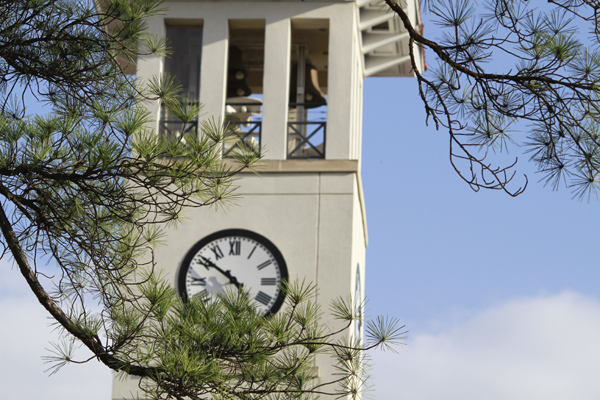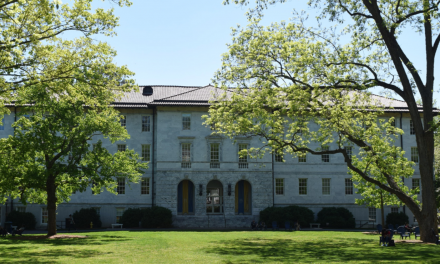Emory’s local chapter for the American Association of University Professors (AAUP) is set to release a statement next week questioning the process that led to the recent department changes.
The association consists of 34 Emory faculty and former administrators and is part of a national organization comprised of more than 500 campus chapters.
The AAUP aims to support academic freedom and shared governance at universities across the United States.
The group met shortly after Sept. 14, when College Dean Robin Forman announced that the College would be phasing out or suspending admission to select programs in the College and Laney Graduate School, according to Barbara Ladd, AAUP’s current president and a professor in the English department. Such decisions, Ladd said, were not Forman’s to make.
“That flies in the face of AAUP recommendations,” Ladd said. “It’s stated very clearly and has been a stated principle of AAUP for decades that responsibility for curriculum is in the hands of the faculty and that a dean or another administrator overturns decisions taken by the faculty only in rare and exceptional cases.”
The statement is the first step toward what could be a long process. Should the national organization conduct an investigation and find issues with faculty governance, Emory would be sanctioned, according to Sharon Strocchia, AAUP’s president-elect and a history professor.
The report would be widely circulated and signal to the public “unsatisfactory conditions of academic governance” at Emory.
“Being sanctioned by the AAUP could very well make it harder to recruit professors, especially if they have other employment options,” Strocchia said.
While administrators such as Forman and Provost Earl Lewis, Emory’s chief academic officer, have said the decision is final, Ladd said she hopes that the University will allow several faculty bodies such as the Governance Committee, Humanities Council and University Senate to review the decision.
The committee that directly advised Forman – the College Financial Advisory Committee (CFAC) – is comprised only of faculty members, but Ladd said the AAUP takes issue with the committee’s origins, its changing constitutional charge and its reports, or lack thereof, to the Governance Committee.
In September 2011, the Governance Committee emailed faculty members to garner nominations for the CFAC, but the committee’s listed responsibilities were vague, according to Ladd.
Reviewing the “sustainability of departments and programs” is “not as clear or as specific as it needs to be when you undertake something like this,” Ladd said.
In contrast with Emory, Ladd cited the University of Hartford, which took extensive steps to ensure proper “faculty by-in” before making serious departmental changes earlier this year. The College created two task forces of 25 and 20 faculty members, respectively.
The first task force focused on the quality and academic merit of departments, and the second force studied administration finances. In the end, the two groups presented a set of recommendations to the University, which acted accordingly.
The AAUP recognizes that institutions must be able to review and discontinue departments, but faculty in those departments should be well-informed early in the process, Ladd said.
“The problem from AAUP’s perspective is not that decisions were made … but it’s the process,” Ladd said. “A nine-member committee – that’s not sufficient for this kind of decision.”
The local chapter, which dates back to 1938, has yet to ask the national organization to investigate the situation, and Ladd hopes that they won’t be forced to do so.
“I hope that the administration and the Governance Committee and other elected bodies of the University will see how important this is – what a significant outpouring of protest we have going on here – and will step in to respond,” Ladd said.
– By Evan Mah
Photography by Jason Lee
The Emory Wheel was founded in 1919 and is currently the only independent, student-run newspaper of Emory University. The Wheel publishes weekly on Wednesdays during the academic year, except during University holidays and scheduled publication intermissions.
The Wheel is financially and editorially independent from the University. All of its content is generated by the Wheel’s more than 100 student staff members and contributing writers, and its printing costs are covered by profits from self-generated advertising sales.






Prof. Ladd has identified (rightly) so many problematic issues. One now hears generally that even members of the previous GovComs felt that they were not getting genuine reports from the CFAC/FFAC or from the GovCom members who sat on CFAC/FFAC. Some have even likened their attempts to get information on what the CFAC was doing as the equivalent of wresting information from the CIA. Unless one engages in an Orwellian distortion of language, one cannot call what the CFAC/GovCom perpetrated on the College and Grad School a “process.” Certainly it was not a legitimate process. And just what was the “peer review” that they keep invoking? That Dean Forman used the CFAC and GovCom to his own purposes (or perhaps those of Pres. Wagner and Prov. Lewis) is even more galling. That a College committee (a College committee, for heaven sakes!) somehow overrode the Grad school is certainly a grave contravention of process.
These changes should not go through. They had no legitimate process behind them and they only have destroyed morale (which was already very low) still further among College faculty. Many faculty members have been more silent than they wish to be, because many are afraid that their departments were also on the longer list that was apparently under consideration. But seeming silence in some corners should not be taken as acquiescence or approval. It is a bitter, seething silence directed at all levels of the administration, the CFAC, and the present GovCom (for rolling over and going into defensive mode this fall–sorry GovCom colleagues, but step up and help deal with this crisis…).
There is a College Faculty mtg with the President and Provost on Wednesday, Oct 31. I hope that the colleagues will show up and speak their minds. I am glad to see the AAUP speaking up. Very welcome.
Thank you, Professor Ladd.
Please give me photo cred on this photo.
-Jason